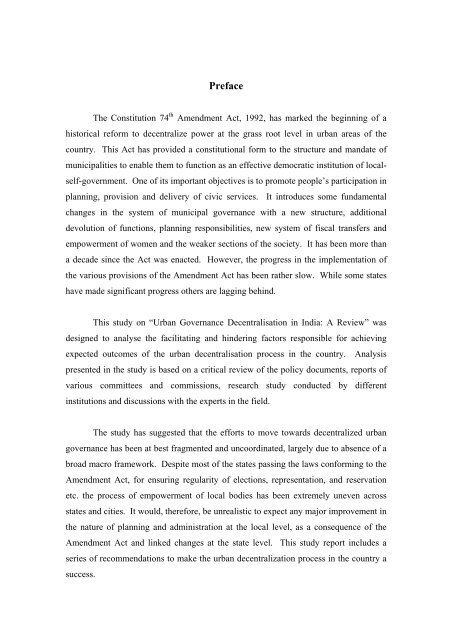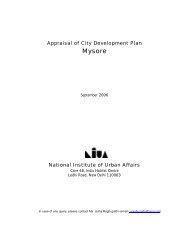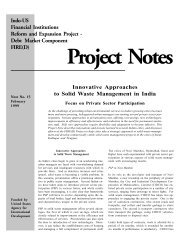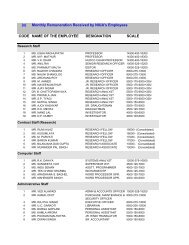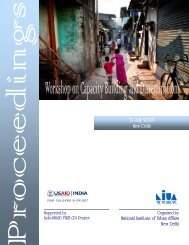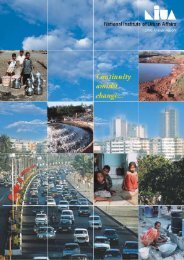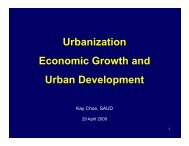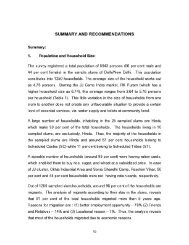Preface - National Institute of Urban Affairs
Preface - National Institute of Urban Affairs
Preface - National Institute of Urban Affairs
Create successful ePaper yourself
Turn your PDF publications into a flip-book with our unique Google optimized e-Paper software.
<strong>Preface</strong><br />
The Constitution 74 th Amendment Act, 1992, has marked the beginning <strong>of</strong> a<br />
historical reform to decentralize power at the grass root level in urban areas <strong>of</strong> the<br />
country. This Act has provided a constitutional form to the structure and mandate <strong>of</strong><br />
municipalities to enable them to function as an effective democratic institution <strong>of</strong> localself-government.<br />
One <strong>of</strong> its important objectives is to promote people’s participation in<br />
planning, provision and delivery <strong>of</strong> civic services. It introduces some fundamental<br />
changes in the system <strong>of</strong> municipal governance with a new structure, additional<br />
devolution <strong>of</strong> functions, planning responsibilities, new system <strong>of</strong> fiscal transfers and<br />
empowerment <strong>of</strong> women and the weaker sections <strong>of</strong> the society. It has been more than<br />
a decade since the Act was enacted. However, the progress in the implementation <strong>of</strong><br />
the various provisions <strong>of</strong> the Amendment Act has been rather slow. While some states<br />
have made significant progress others are lagging behind.<br />
This study on “<strong>Urban</strong> Governance Decentralisation in India: A Review” was<br />
designed to analyse the facilitating and hindering factors responsible for achieving<br />
expected outcomes <strong>of</strong> the urban decentralisation process in the country. Analysis<br />
presented in the study is based on a critical review <strong>of</strong> the policy documents, reports <strong>of</strong><br />
various committees and commissions, research study conducted by different<br />
institutions and discussions with the experts in the field.<br />
The study has suggested that the efforts to move towards decentralized urban<br />
governance has been at best fragmented and uncoordinated, largely due to absence <strong>of</strong> a<br />
broad macro framework. Despite most <strong>of</strong> the states passing the laws conforming to the<br />
Amendment Act, for ensuring regularity <strong>of</strong> elections, representation, and reservation<br />
etc. the process <strong>of</strong> empowerment <strong>of</strong> local bodies has been extremely uneven across<br />
states and cities. It would, therefore, be unrealistic to expect any major improvement in<br />
the nature <strong>of</strong> planning and administration at the local level, as a consequence <strong>of</strong> the<br />
Amendment Act and linked changes at the state level. This study report includes a<br />
series <strong>of</strong> recommendations to make the urban decentralization process in the country a<br />
success.
We gratefully acknowledge the support from United Nations Development<br />
Programme (UNDP) for sponsoring the study under their programme <strong>of</strong> supporting the<br />
Economic Reforms <strong>of</strong> Government <strong>of</strong> India with a view to provide policy advise to the<br />
Government for effective implementation <strong>of</strong> Constitution (74 th ) Amendment Act and<br />
other reform measures initiated to improve the quality <strong>of</strong> life <strong>of</strong> urban residents. Dr.<br />
Mukesh Mathur coordinated and designed this study and Dr. (Mrs.) Debolina Kundu,<br />
Consultant to the study undertook the responsibility <strong>of</strong> conducting the study with the<br />
support from Dr. O P Bohra. Valuable inputs were provided by a number <strong>of</strong> experts<br />
who participated in the presentation workshop organized by the UNDP in its Delhi<br />
<strong>of</strong>fice in October 2003 as a part <strong>of</strong> the study. We are thankful to Mr. Pradeep Sharma<br />
and Ms. Happy Pant <strong>of</strong> UNDP, Dr. George Mathew, <strong>Institute</strong> <strong>of</strong> Social Sciences, New<br />
Delhi and other experts for their valuable comments on the draft report.<br />
Vinod Tewari<br />
Director


